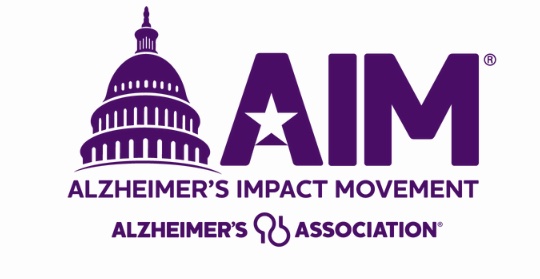Alzheimer's Association

About Alzheimer's Association and AIM
The Alzheimer's Association leads the way to end Alzheimer's and all other dementia — by accelerating global research, driving risk reduction and early detection, and maximizing quality care and support. The Alzheimer’s Impact Movement (AIM) advances and develops policies to overcome Alzheimer’s and all other dementia through increased investment in research, enhanced care and improved support.
Hispanic Americans and Alzheimer's
Approximately 13% of Hispanics who are 65 or older have Alzheimer's or another dementia. While Hispanics are 1.5 times more likely than Whites to have dementia, more research is needed to understand why. Almost 9 out of 10 Hispanics (85%) say it is important for Alzheimer’s and dementia care providers to understand their ethnic or racial background and experiences. Learn what the Alzheimer's Association is doing to address health disparities and provide support for Hispanic community members living with Alzheimer's or another dementia.
2024 Alzheimer's Disease Facts and Figures Report
Each year, the Alzheimer’s Association releases the Alzheimer’s Disease Facts and Figures report. The 2024 report (released in March) reveals that dementia caregivers report difficulties in navigating dementia care within the U.S. health care system. Caregivers also report the stresses of caregiving. The new report estimates that nearly 7 million people age 65 and older in the U.S. are living with Alzheimer’s dementia, with the cost of care for these individuals this year projected to reach $360 billion — a $15 billion increase from a year ago. This year’s special report, Mapping a Better Future for Dementia Care Navigation, provides a look into dementia care navigation, which is defined as support to people living with dementia and their caregivers to overcome barriers that impact care and health outcomes. Additional state data are available at alz.org/facts-states.
Alzheimer’s State Policy Priorities
An overview of the nationwide state policy priorities the Alzheimer’s Association and AIM are supporting a is available at alzimpact.org/statepriorities.
- Goal 1: Increase Access to Dementia Care, Support and Treatment
- Goal 2: Improve Quality of Care
- Goal 3: Advance Risk Reduction, Early Detection, and Diagnosis
- Goal 4: Ensure a Coordinated Statewide Response to Alzheimer's
NHCSL BBA Contact
Jennifer Rosen
Vice President, State Affairs
jrosen@alz-aim.org
